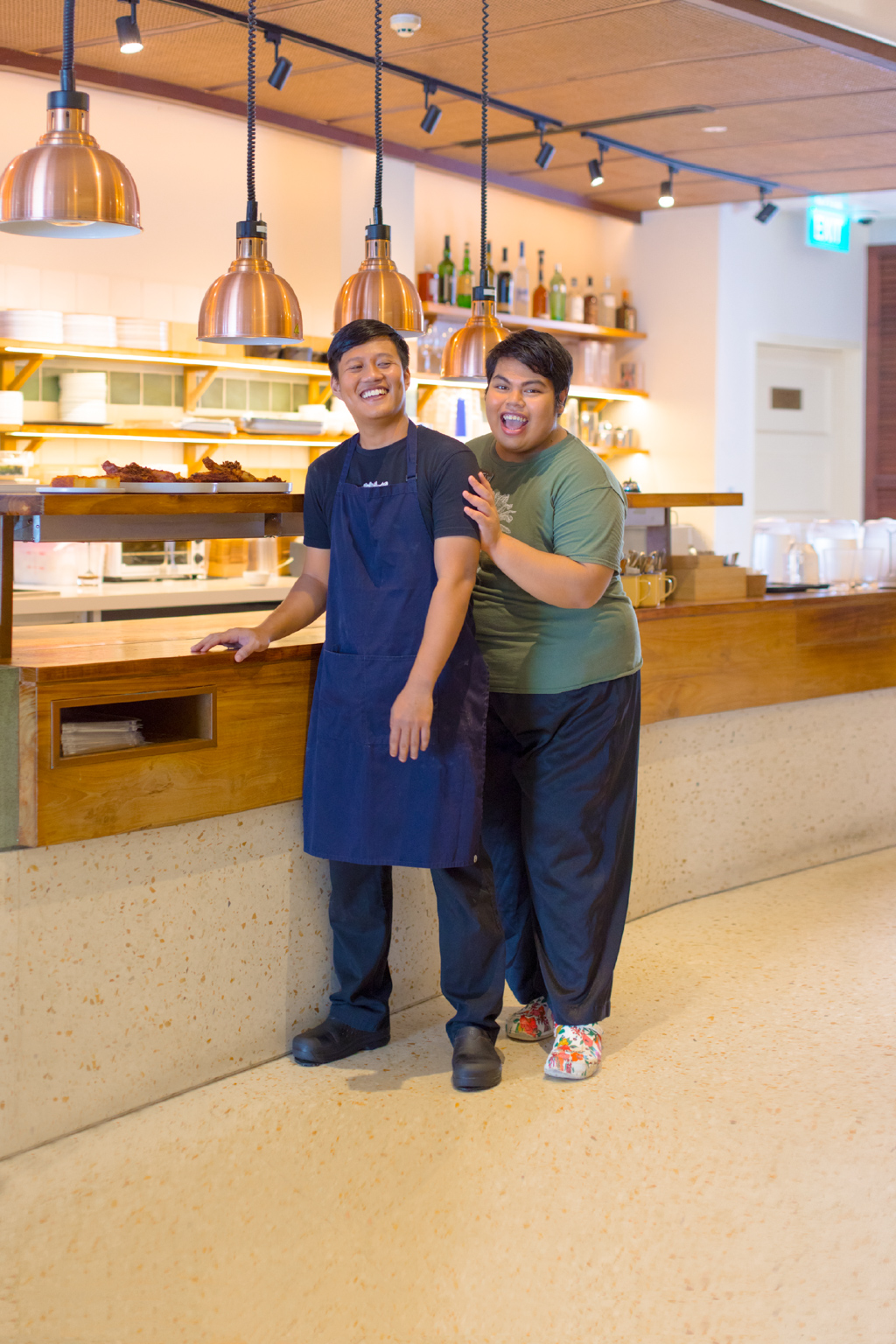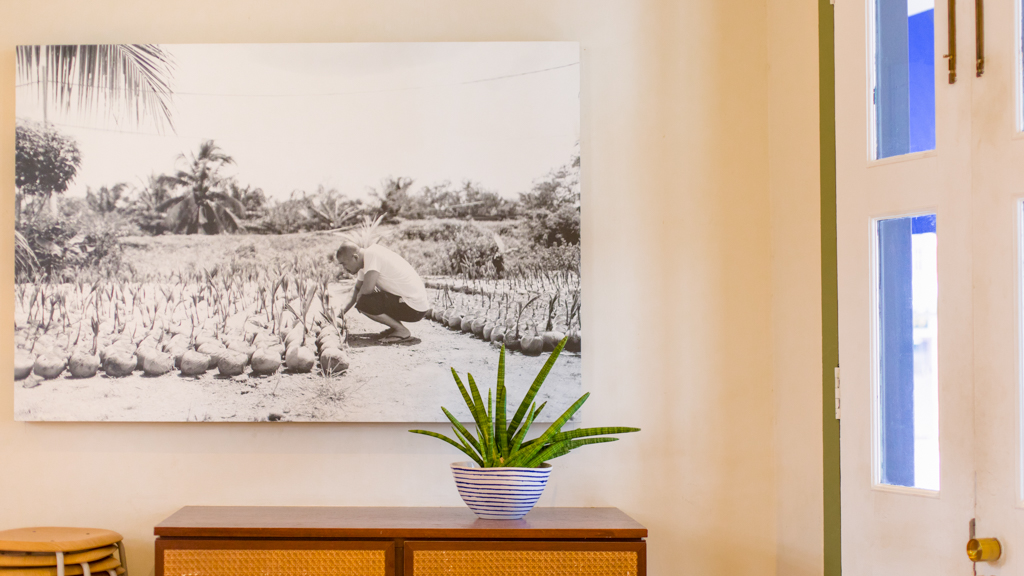STB x Shentonista — Modern Traditions
Featuring
Muhammad Fitri Bin Abdul Rahman (Fifi) and Manarul Hidayah Bin Sulman (Ayun) from The Coconut Club. Answers by Amir Jamil, Assistant General Manager and Swenn Chng, Assistant Store Manager
F&B

Nasi lemak stores are a dime a dozen, and we all probably have our favourites, whether it’s a highly-raved about eatery or a small family-run hawker stall. The dish itself consists of a handful of key ingredients like coconut rice, anchovies and peanuts, a fried chicken wing or kuning fish, sliced cucumbers, a fried egg, and a heap of sambal. It sounds simple, but doing it well and creating just the right balance of flavours is more challenging than it seems.
Enter The Coconut Club—a bustling, upscale nasi lemak joint that prides itself not only on its Michelin Bib Gourmand nasi lemak and traditional desserts, but also on its community spirit.

At close to $20 a pop, one might think that The Coconut Club’s nasi lemak would be some modernised, deconstructed, or avant garde version of the dish, but their humble offering is rooted in tradition, while utilising some of the best ingredients sourced from the region. Their space also brims with warmth and friendly faces, so when we step inside for a meal, we leave not only with a full belly, but a full heart as well. Since opening their doors in 2016, they’ve quickly gained a cult following—a testament to the quality of their food and service.
In the next part of our series created in collaboration with Singapore Tourism Board, we photograph Muhammad Fitri Bin Abdul Rahman and Manarul Hidayah Bin Sulman—better known as Fifi and Ayun respectively—two of the friendly staff at The Coconut Club. We also speak to Swenn Chng and Amir Jamil, the Assistant Store Manager and Assistant General Manager at The Coconut Club respectively. From retaining traditions to superstar staff, the pair shares what it’s like to be a part of the Coconut Club family.

Often, when we think of nasi lemak, we think of the $3 kind from the hawker centre, but The Coconut Club’s version is a lot pricier than that. What sets The Coconut Club’s version of the dish apart from other stores, and how was this developed?
Amir (A): We make everything from scratch using wholesome, natural ingredients, without the use of anything artificial or processed. There are no shortcuts taken, just quality ingredients, a lot of labour and time.
It took us two years of development before we opened the doors. The founder, Chef Eng Su, focused on sourcing the best, freshest produce and ingredients and dedicated himself to experimenting and innovating techniques to make every element of our nasi lemak as flavourful and balanced as possible.
The Coconut Club also serves kuehs for dessert. Are they also handmade?
A: Yes, we also make our kuehs from scratch, the same way our grandmothers used to make them, passing the recipes and techniques down through the generations. We focus on traditional kuehs from the old world that have been forgotten, so that our culture is not erased with time.

Apart from retaining traditions in your food, how else do you create an authentic Singaporean experience for your patrons?
Swenn (S): I really love the shophouse aesthetic, and it just so happened that we always place ourselves in shophouses. Before we moved up to 28 Ann Siang Road, we were just down the street at 6 Ann Siang Road, also in a shophouse. It was different because we always had the doors open with no air conditioning, which was truly authentic because when we ate nasi lemak back in the day, it would be in coffee shops—it’d be really hot, and everyone would be sweating, but then everything was just so bustling. Customers would enjoy the food and have conversations with their friends, and the staff would be running around constantly, serving up good food.
Now, we’ve changed our plates and installed air conditioning so that everyone is more comfortable, but still we stick to our roots. We used to have a little window, where you could observe the kitchen, and we tried to replicate that here. So if you come when we’re still in service, you get to see the chefs cooking and plating the food. You’d also see the staff just sprinting from end to end because it’s a bigger place!

You mentioned that you tend to stick to traditions with your kuehs and nasi lemak. When it comes to food in general, how do you innovate while staying true to traditions?
S: We don’t mess around with the main dish because we know that’s what we do well, so we try to be more innovative with our drinks or other side dishes. For example, we make our own coconut milk, and everyone loves ice cream, so our way of keeping up with the times was collaborate with local gelato boutique Birds of Paradise. Our kuehs are very traditional, but if you get a kueh bingka, which is a tapioca cake, we serve it with a scoop of ice cream. That’s kind of like modernising the dish, but still keeping true to our roots.
What does a typical day at the Coconut Club look like for you?
S: I always set up the restaurant first—especially with Covid-19, we make sure everything’s clean, so every night, we sanitise the tables and chairs, and in the morning, we do it again. Then, I make sure all of our pre-orders are properly accounted for in the kitchen, grab sambal from the kitchen to pack, and conduct quality checks on our kuehs. I then decide what we want to push for each day, to make sure that all our customers get a chance to try what’s good. And then we do just a little brief in the morning about what we’re going to do during lunch, and check in to see if how everyone’s feeling that day.

We hear that your staff really enjoy working at the restaurant. Can you tell us more about what keeps them coming back?
S: One thing that we really try to do is make sure everyone is okay. The morning briefing is that one moment in the day where you get to celebrate something that you’ve accomplished, or just say, “hey, I’m having a really bad day today” because of something you’re going through. So it’s truly caring about everyone and giving honest advice and opinions. All the senior staff have been here for at least two years or so. I left and came back, just because I really love that we’re very authentic. I’ve never been to another place where everyone is so open about everything. If I’m having a bad day, I can talk to anyone about anything.
What are some customer favourites of the restaurant, food or otherwise?
S: The food is good—we’ve proven ourselves after five years or so now. I think the most common feedback we receive is about one of our staff, Fifi. She is truly our superstar. Without her, we wouldn’t have as many good reviews. She used to work in hospice care, if I’m not wrong, so she’s really good with interacting with people. Her focus in whatever she does is making sure that the customer is very happy. She’s also very, very bubbly. She never fails to make jokes with people, making them feel comfortable the moment they come in.

What’s something that people might not know about The Coconut Club?
S: Every day, maybe like five times each day, we’re asked whether we’re halal or not. The food is halal. Most of my chefs are Muslim. The only reason we don’t have the halal certification is because we sell alcohol in the restaurant. Traditionally, nasi lemak is a Malay dish. For us to serve it with alcohol is unusual, but since having a drink with your food has become popular, we’ve tried to accommodate to different crowds. Most of our beers are from local breweries—just another way of us supporting local.

The Coconut Club
28 Ann Siang Road, Singapore 069708
Open 11am to 3pm Monday to Sunday, 6pm to 930pm Tuesday to Sunday
Website | Instagram | Facebook
This series was produced with the support of the Singapore Tourism Board’s SG Stories Content Fund Season 2. View more stories here.
Like this? Share it.
What others are saying
There are no comments yet.
Leave a Reply